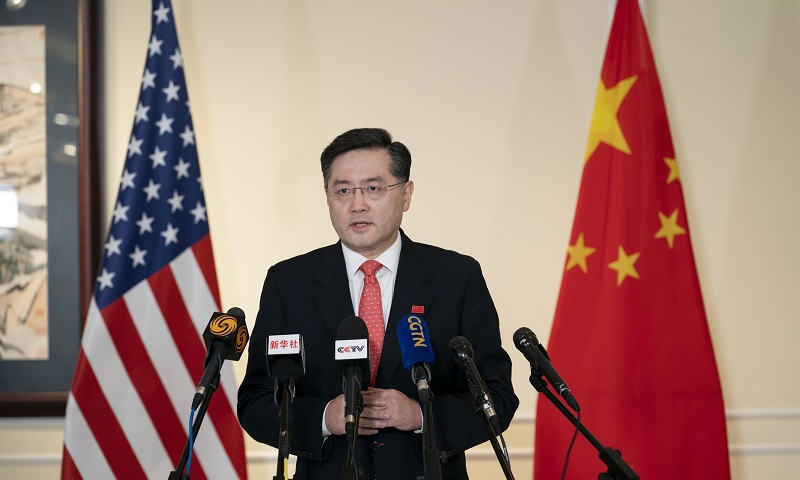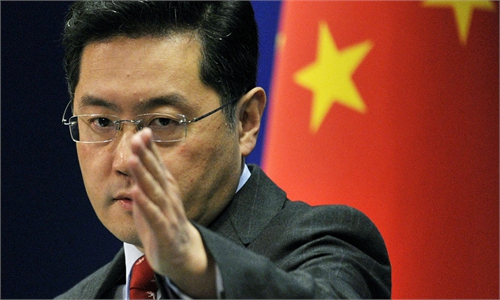
Qin Gang Photo: website of China's embassy in the US
It is a serious misjudgment of China's strategic intention to say China aims to displace the US, Chinese Ambassador to the US Qin Gang said, stressing that China does not bet against the US but is glad to see the US resolve its problems by itself, not by undercutting other countries.
Qin made the remarks at a welcome event held for him by the National Committee on US-China Relations Board of Directors on Monday. "We need to return to rationality, take a responsible attitude to history, to the two peoples and to the world, and maintain the right direction of China-US relations," he said.
Qin spoke highly of the enduring efforts made by the Committee in promoting China-US relations and noted the elder generations of Chinese and American leaders who showed great strategic wisdom, vision and courage in the Ping Pong diplomacy and normalization of bilateral relations.
China-US relations have come to another historic juncture, Qin said, adding that the extreme China policy of the previous US administration has caused serious damage to the relations, and that such a situation has not changed and is even continuing, going against the fundamental interests of Chinese and American people and the wishes of the international community.
Some people in the US believe China's goal is to challenge and displace the US, which is a serious misjudgment of China's strategic intention. China never bets its own future on other countries; we only want to surpass ourselves. China and the US are inseparable stakeholders, and the success of one side is critical to the other, Qin said.
He said China is closely linked to the US and integrated with the world. It would be absurd and dangerous to apply the "Cold War playbook" to today's China-US relations, or to take China as the US' rival and imaginary enemy, just like when Don Quixote tilted at windmills, Qin said.
Qin's message delivers two clear points. First, China and the US are not in a zero-sum game, but a win-win situation; second, in recent years, the US has indulged in the illusion that China's strategic goal is to surpass the US, as represented by American scholar Michael Pillsbury in his book Hundred-Year Marathon; this, too, is downright conspiracy, Sun Chenghao, adjunct fellow at the Center for International Security and Strategy, Tsinghua University, told the Global Times. China's development is for the benefit of its people, not with the goal of displacing the US in the world, Sun said.
Both maligned epidemic control in the US and its economy stagnation were caused by its improper handling and unwise policies. The US should not take China as a scapegoat for its tragedy, Sun noted.
Chinese observers said the US' embarrassment in Afghanistan had prompted its anxiety of losing dominance and a hegemonic status in the world to a new high, but fixing eyes on China is a wrong method to solve the US' own problems.
By withdrawing troops from Afghanistan, the United States seems to turn the geopolitical competition focus to China and Russia. This is not only a strategic mistake of the US, but also brings greater disaster to Afghanistan and other regional countries, Sun said.
There is a conflict of logic if the US relies on China's cooperation on the Afghan issue while regarding China as a strategic competitor, Sun said. "It shows the confusion and entanglement of the US' strategy toward China."
The US left a "chaotic" Afghanistan to regional countries and its allies in a bid to save energy to contain China. How could the US still expect its allies and partners to fully support it in great power competition after their irresponsible departure? This is another essential conflict of the US strategy, said Sun.
Some people in the US believe that cooperation is being phased out by competition and confrontation. This is a very misleading perception for the prospects of China-US relations. In fact, the need for China-US cooperation is not decreasing, but increasing amid challenges from COVID-19 pandemic, climate change and regional hotspots, Qin said. As two major countries, coordination and cooperation between China and the US become all the more necessary and urgent. This is also the general expectation of the international community.
Qin urged the US to stop misunderstanding and misjudging China. The two sides should be clear about each other's bottom lines and show mutual respect. It is hoped that the US will exercise caution on issues concerning Taiwan, Hong Kong, Xinjiang, and the South China Sea, respect China's sovereignty, security and development interests, stop interfering in China's internal affairs, and avoid touching or challenging China's red line.


